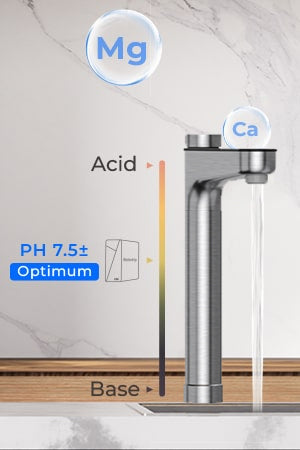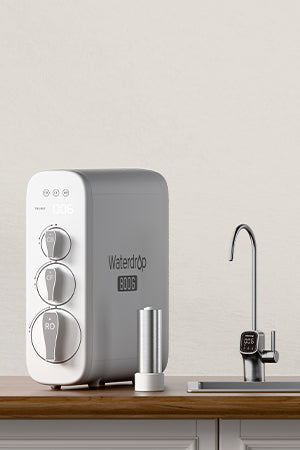From washing dishes to keeping the body hydrated, water is essential for our
daily activities. But the quality of the water we use varies. The
Popularity of hard water, which contains high concentrations of minerals such as calcium and magnesium, is a
common problem for many people. Let us explore the world of water softeners, which are primarily
was created to treat these problems caused by hard water.
Definition of water softeners
The integrated filter system, which was created for the whole house, is a
Water softeners. The magnesium and calcium minerals that contribute to water hardness have been successfully removed by
a process called ion exchange. Hard water is a serious problem for
Households, as it can lead to contamination in the pipes, which can lead to blockages and
Reduce water pressure.
Due to this size, appliances such as dishwashers, coffee machines and
Ice machines have a short lifespan. In addition, the water heating systems are particularly weak. If
When the water is heated, calcium and magnesium solidify and form deposits in the water heater.
This creates a unique popping sound that sounds like popcorn, as limescale builds up on the heating elements
sets..
Without a water softener, the dishes often come out of the dishwasher and leave
Streaks and stains, and clothes often require additional detergent to remove a dirty appearance
Shampoo and soap do not lather well and shower curtains collect thin foam. After bathing in
Hard water can make your skin dry and itchy and your hair can become soft and sticky. Dealing with
Dealing with these effects of hard water requires a lot of time, effort and money.
The whole house water softener can help solve this problem. This system
successfully solves the problems caused by water hardness and makes your entire house cleaner
and more efficient with water.
If you are looking for a reverse osmosis system, please click for more
Information:
How do fabric softeners work in the home?
By removing dangerous minerals from the water before it reaches the
Faucet, Ion Exchange Water Softener with Base-Base Technology effectively solves the problem of
Scaling. To get the benefits of softened water for your home, this water softener is included in the
pipe system and is usually placed near the main inlet.
These domestic water softeners use ion exchange processes to remove harmful calcium
(Ca) and magnesium (Mg) ions that cause limescale and replace them with sodium (Na) ions.
The hardness of water is caused by calcium and magnesium ions in hard water, which
Water softener eliminated and replaced with sodium ions.
The resin beads in the plasticizer are in a so-called regeneration process
rinsed with a salt solution. The pearls rejuvenate and continue to effectively soften the water. It is
important to remember that this softening process adds negligible additional sodium to the
water supply, which is usually safe. However, installing a water filter can
Further reduce sodium content and improve the taste of your water if you are concerned about the level
make.
How do I know if a water softener is needed at home?
To maintain the comfort of your home and yourself, it is important
to determine whether you need a water softener or not. If you notice that a lot of soap scum
accumulates, your towel becomes hard and hard, or if you have difficulty lathering during the shower
produce, you may have problems with hard water. Hard water filter is a must for your home.
Contrary to popular belief, people with private wells are particularly
hard water are not the only ones who need a water softener. Even if you get water from your city
or your village, you can get hard water directly from the tap. The communities clean the
Water to remove impurities, but they usually leave hard minerals behind as they do not
pose a health risk.
If you want to provide your family with healthy, clean drinking water, the
Installing a water filter system under the sink is also a good choice.
It is important to remember that the hardness of the water, at each
level, can have a negative impact on your home and your daily life. If you have a well,
where municipal treatment is not available, you may need additional filtering techniques,
to improve the quality of your water.
What to look for when choosing a water softener?
There are several key factors to consider when choosing the right
Water softener must be considered. You must first choose the type of water softener you
While most families prefer traditional water softeners, salt-free
Water softeners may be more suitable in some cases.
The size of the desired plasticizer must be determined as the next critical step
The size of your house and how much water you use every day will determine this choice
In exceptional cases, such as families with sporty children who regularly use washing machines,
a larger soft water system may be required to meet the demand.
On average, a person consumes 100-175 gallons of water per day. The number
of people in your home should be multiplied by 100 to determine the correct size fabric softener.
Then multiply this number by the hardness in your water, which can be determined using a hard water test strip
This calculation allows you to choose a water softener that will successfully
with water hardness to handle the unique needs of your home.
water quality problems
A typical problem caused by hard water is the formation of
Limescale in your household appliances. When water containing calcium is heated, it crystallizes into limescale, which
dishwashers, washing machines and kettles. This accumulation reduces their
effectiveness significantly.
Scale also has a negative impact on the performance and efficiency of heating systems
It acts as a thermal insulator, slows down the water flow, increases the energy needed to heat the water
needed and ultimately increases your heating costs. Hard water minerals in piping systems can lead to
limescale deposits, which can lead to failures and higher maintenance costs.
Your skin’s reaction to minerals in hard water can cause dryness and
Itchy skin conditions such as eczema can be aggravated by hard water. If you
If you wash clothes in hard water, they can lose their color and softness and cause itching on your skin.
In addition, too many minerals accumulate on the scalp, which leads to dull, frizzy hair and
more shampoo needed.
Hard water minerals can also cause stains on faucets, furniture and dishes
Bathroom surfaces produce soap scum, which makes cleaning difficult and time-consuming
As a result, you spend more time and money on maintaining and cleaning products.
The long-term effects of hard water on household budgets include
rising cleaning costs and the need to repair electrical equipment. It also affects the
environment because it uses too much energy and detergent. Solving your hard water problems
can save you money and make your home more environmentally friendly and efficient.
Is it safe to drink soft water?
Yes, it is safe to drink soft water. Calcium and magnesium are two
Minerals that contribute to water hardness and are extracted from demineralized water during treatment
Water softeners replace these minerals with sodium or potassium ions through a
Ion exchange process. Trace amounts of sodium or potassium added during this process are
usually well below the recommended daily allowance for a healthy diet.
However, if you are on a low-sodium diet due to conditions such as high blood pressure
you may want to consider different water sources for drinking and cooking
For example, a separate, non-softened faucet in your kitchen. In addition, patients with
If you have special health problems, talk to your doctor about the amount of drinking water you drink.
In addition, it is important to note that some people find the taste of
hard water over soft water. In this case, the choice of drinking water can depend on personal
preferences are influenced.


































































